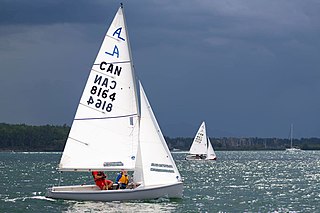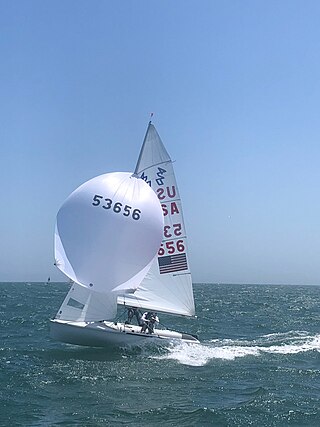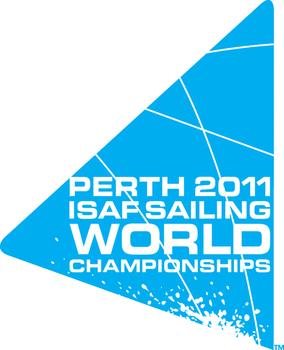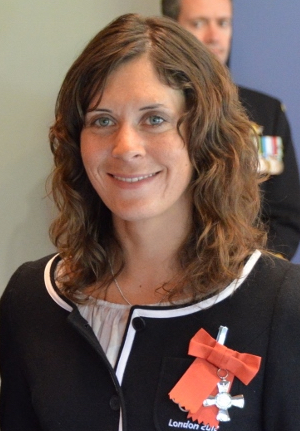
The Queen's Gaels is the athletics program representing Queen's University in Kingston, Ontario, Canada. The main athletics facilities include Richardson Memorial Stadium, the Queen's Athletics and Recreation Centre, Nixon Field and Tindall Field. The team colours are gold, blue, and red.

The Albacore is a 4.57 m (15 ft) two-person planing dinghy with fractional sloop rig, for competitive racing and lake and near-inshore day sailing. Hulls are made of either wood or fiberglass. The basic shape was developed in 1954 from an Uffa Fox design, the Swordfish. Recent boats retain the same classic dimensions, and use modern materials and modern control systems.

The GP14 is a wooden or fibreglass hulled double-handed fractional Bermuda rigged sailing dinghy designed by Jack Holt in 1949.
Boat racing is a sport in which boats, or other types of watercraft, race on water. Boat racing powered by oars is recorded as having occurred in ancient Egypt, and it is likely that people have engaged in races involving boats and other water-borne craft for as long as such watercraft have existed.

The Finn dinghy is a single-handed, cat-rigged sailboat, and a former Olympic class for men's sailing. Since its debut at the 1952 Summer Olympics in Helsinki, the Finn featured in every summer Olympics until 2020, making it the longest serving dinghy in the Olympic Regatta and one of the most prolific Olympic sailboats,. The Finn is a physically demanding boat to race at the highest levels, especially since the class rules now allow unlimited boat rocking and sail pumping when the wind is above 10 knots. The event will not feature on the Olympic programme from 2024.

World Sailing (WS) is the world governing body for the sport of sailing recognized by the International Olympic Committee and the International Paralympic Committee (IPC).

The Optimist is a small, single-handed sailing dinghy intended for use by young people up to the age of 15.

The International 420 Dinghy is a sailing dinghy popular for racing and teaching. The hull is fiberglass with internal buoyancy tanks. The 420 has a bermuda rig, spinnaker and trapeze. It has a large sail-area-to-weight ratio, and is designed to plane easily. The 420 is an International class recognised by World Sailing. The name refers to the boat's length of 420 centimetres.

The Weymouth and Portland National Sailing Academy is a centre for the sport of sailing on the Isle of Portland, Dorset, on the south coast of England. The academy building is located in Osprey Quay on the northern tip of the island, and the waters of Portland Harbour and Weymouth Bay, adjacent to the site, are the main areas used for sailing. Local, national and international sailing events have been held at the site since it was opened in 2000, and in 2005 WPNSA was selected to host the sailing events at the 2012 Olympic and Paralympic Games.

The 29er is a two-person high performance sailing skiff designed by Julian Bethwaite and first produced in 1998. Derived from the Olympic class 49er class, it is raced in the ISAF Youth Sailing World Championships. The 29er is able to reach high speeds fairly quickly by having a sleek and hydrodynamic hull and will often exceed the wind speed when planing both up and downwind.

The Dragon is a one-design keelboat designed by Norwegian Johan Anker in 1929. In 1948 the Dragon became an Olympic Class, a status it retained until the Munich Olympics in 1972. The Dragon's long keel and elegant metre-boat lines remain unchanged, but today Dragons are constructed using the latest technology to make the boat durable and easy to maintain. GRP construction was introduced in 1973 and the rigging has been regularly updated.

The RS Feva is a two-person sailing dinghy designed by Paul Handley in 2002. It is manufactured and distributed by RS Sailing. The RS Feva is an International Sailing Federation (ISAF) International Class, a Royal Yachting Association (RYA) Supported Junior Class, and has been selected by the Dansk Sejlunion and Norges Seilforbund for major sailing growth projects.
Emilia Tsoulfa is a Greek sailor.

The 2011 ISAF Sailing World Championships was held in Perth, Western Australia, this was the third edition of the ISAF Sailing World Championships. It is the world championships for all disciplines used at the upcoming Olympics. As it used to allocate 75% of the qualification quota for the 2012 Summer Olympics this event has added significance.
The ISAF Team Racing World Championship is a team racing event now held every two years by the International Sailing Federation (ISAF). The first Team Racing World Championships were held in West Kirby, Great Britain in 1995. Great Britain won and so became the first nation to record its name on the ISAF Team Racing World Trophy, donated to ISAF by the West Kirby Sailing Club. A youth Championship began running in parallel with the main event since 2005. Summary information on the first three events is tabled below - full information will be found on the Team Racing Championships results page of the ISAF website. The appearance of West Kirby as the first championship host club reflects the club's pivotal role in promoting team racing – fostered by the activities of the Oxford & Cambridge Sailing Society.
World championships in sailing are world championships organised or sanctioned by World Sailing. As a sport, sailing has the largest number of world championships due to the diversity of equipment and disciplines.

The Britannia Yacht Club (BYC) is a private social club, yacht club, and tennis club based in Britannia, a neighborhood in Ottawa, Ontario, Canada. It was founded in 1887 by a group of cottagers.

Joanna Ayela Aleh is a New Zealand sailor. She is a national champion, a former world champion, and an Olympic gold medallist.
The 5.5 Metre World Championship are international sailing regatta in the 5.5 Metre class organized by the host club and the International 5.5 Metre Class Association and recognized by the World Sailing.

The Esailing World Championship (ESWC) is an annual esports competition, first held in 2018 and officially recognized by World Sailing the main sports governing body. Esailing consists of real time regatta simulation via video game.















